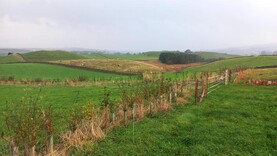Most welfare breaches are non-farm animals
The overwhelming majority of prosecutions for animal welfare offences in NI are not related to farm animals, figures from DAERA confirm. The latest available statistics show that prosecution action commenced for 64 cases related to non-farmed animals in NI during 2022. Only three prosecutions for welfare offences against farm animals occurred during the same year.
Muir to press for land lease tax break
Agriculture Minister Andrew Muir is planning to ask the UK government to introduce tax incentives to encourage longer-term land lease agreements. In response to a written question from DUP MLA Diane Dodds, Minister Muir said he was aware that his predecessor Edwin Poots put a similar case to the UK government when he was in the post.
“I plan to make further representations to the UK Government after the General Election,” the Alliance MLA said.
Bluetongue outbreak
There is a growing likelihood that bluetongue will be re-introduced to Britain through infected midges from northern Europe, the UK’s chief vet has said.
“We know that the likelihood of bluetongue virus entering Great Britain is increasing and so I would urge farmers to remain vigilant and report any suspicions,” Christine Middlemiss said.
The latest update from the UK government states that farms in England close to the coast from Norfolk to Kent and from Kent to Devon are “at highest risk of incursion”. The first case of the BTV-3 strain of the virus was identified in England last November. Since then, 126 cases have been confirmed on 73 premises in four English counties, with the last case identified on 8 March 2024. Royal Highland Show society loses £3.6m
The organisation behind the Royal Highland Show lost £3.6m last year, according to its latest financial accounts. In the 12 months to November 2023, the Royal Highland and Agricultural Society of Scotland (RHASS) had overall income of £11.74m and total expenditure of £15.38m. Within those figures, the Royal Highland Show on its own generated £6.11m, but costs associated with the event came to £8.53m, equating to a loss of £2.41m. The society has been returning financial losses in recent years, with a deficit of £1.2m recorded in 2022 and £0.8m in 2021.
Copper poisoning in sheep warning
A scientist at the Agri Food and Biosciences Institute (AFBI) is warning farmers about the risks of chronic copper poisoning in sheep.
Siobhan Corry said the condition is common during prolonged periods of concentrate feeding, especially if animals also experience stress or changeable weather. Sheep are susceptible to toxic effects of excess copper.
In particular, the condition is frequently observed in Charollais, Texel and Suffolk breeds.
“Copper poisoning is slow to develop, but sudden in onset. The eyes and skin become jaundiced and post-mortem examination reveals an orange liver, black kidneys, and red/brown urine,” Corry said.
Treatment options exist, but they only work in the early stages of the disease and are still not always effective.
Dale Farm creates 30 new jobs at Dunmanbridge
Dale Farm has announced 30 new jobs will be created following completion of a £70m investment at its flagship cheese plant at Dunmanbridge, outside Cookstown.
The Dunmanbridge factory currently employs 345 people.
The new positions created include plant operatives, as well as technical and engineering roles.
NI fertiliser sales up 74% in early 2024
The volume of fertiliser delivered to NI farms in the first three months of 2024 was up 74% when compared to the same period last year.
The latest official figures from DAERA show that 51,300t of fertiliser were purchased in the first quarter of 2024, compared to 29,500t from January to March 2023.
However, the first quarter totals for both 2024 and 2023 are low when compared to figures for the same period in previous years.
DAERA statistics show that 103,500t of fertiliser moved in early 2022, 124,300t in 2021, and 121,000t were delivered in the first quarter of 2020.
Similar to early 2023, local farmers held off buying fertiliser in the first quarter of 2024 until it was needed due to the expectation of falling prices. Tight cash reserves and wet weather were other factors behind lower than usual fertiliser deliveries.






 This is a subscriber-only article
This is a subscriber-only article










SHARING OPTIONS: